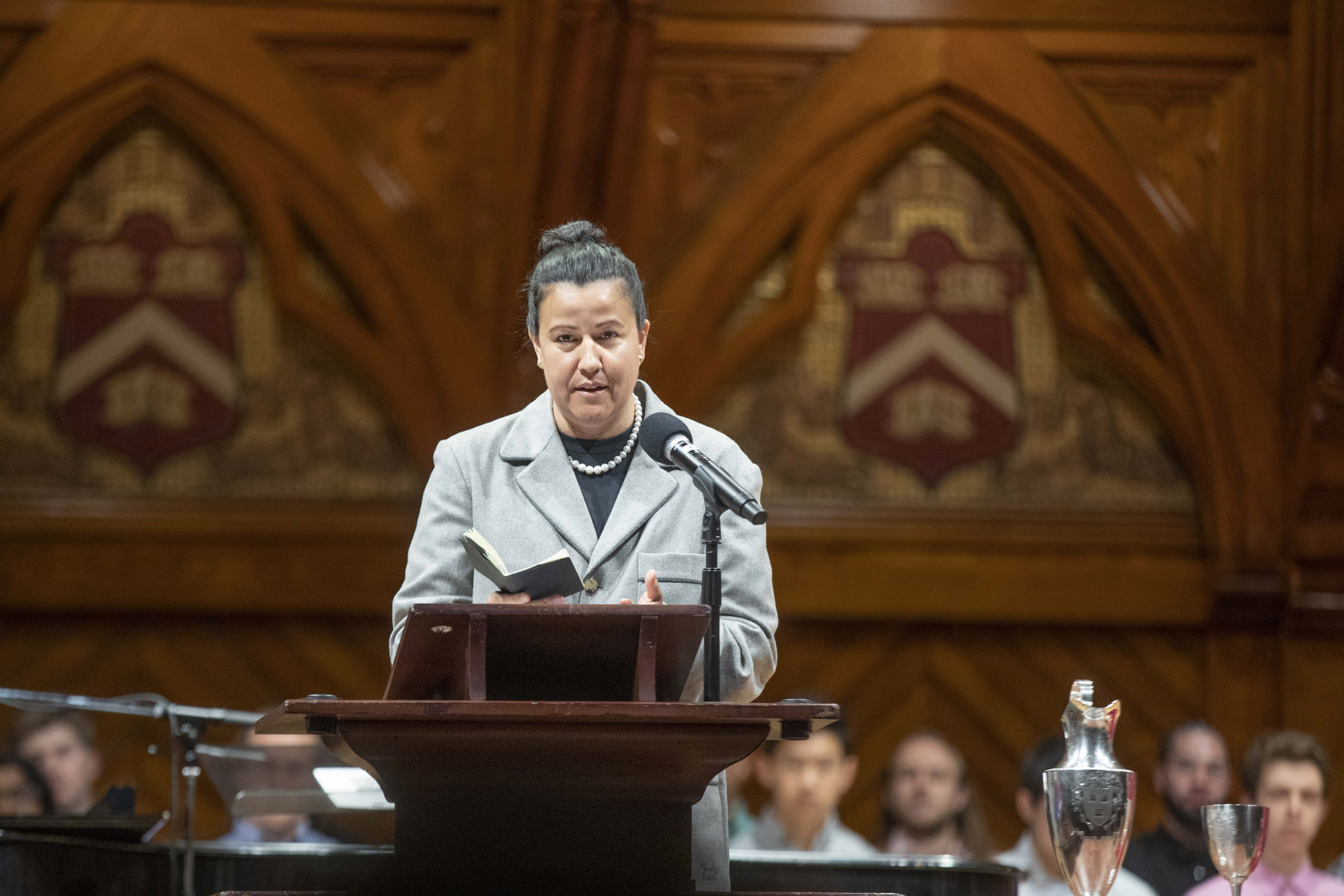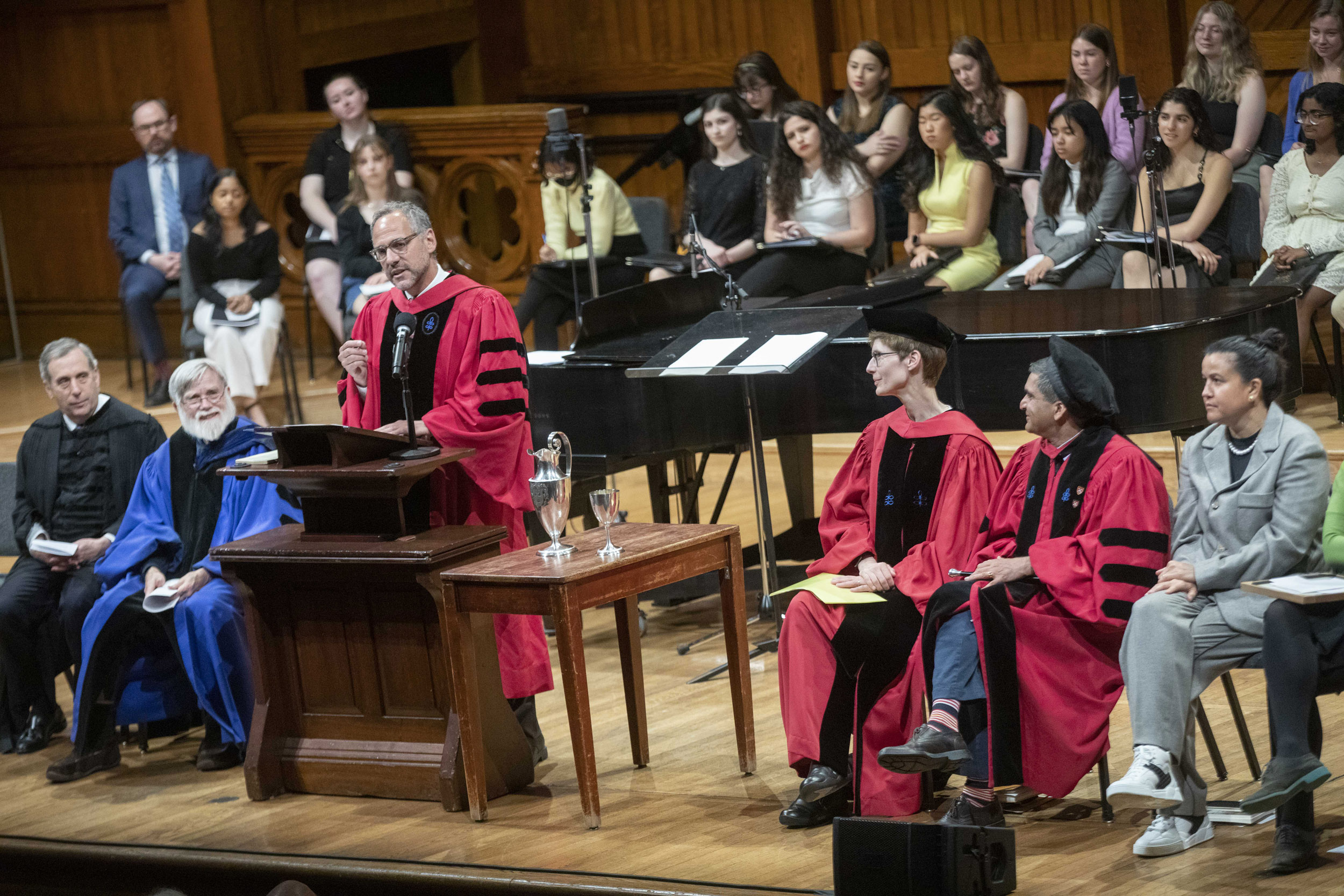
“One of the most important gifts poetry has given me is that it’s taught me that the ordinary is extraordinary,” said Natalie Diaz, speaking during the Phi Beta Kappa Literary Exercises.
Photos by Kris Snibbe/Harvard Staff Photographer
Power of poetry, warning to preserve academic freedom
Poet Natalie Diaz, Sloan Foundation President Adam Falk deliver thoughts at Phi Beta Kappa Literary Exercises
Celebrated poet Natalie Diaz urged students and attendees of the Phi Beta Kappa Literary Exercises to consider how poetry can be a powerful conduit for connecting with others.
“Poetry is where I can love who and what are most difficult to love in this world,” Diaz said Tuesday morning at Sanders Theatre. She shared with the audience that her brother, who struggles with addiction, was the inspiration for her first collection of poems, “When My Brother Was an Aztec” (2012). It allowed her to process her relationship with him in a way that helped her better navigate the world.
“Poetry is a place where I can look at my brother and love him in ways that I can’t in my every day,” she said. She told the newest inductees into PBK: “I wish that whether it comes through poetry or anything else that you love, that you have that place to find love.”
The annual Commencement week event marks the induction of some of the College’s most gifted students into the nation’s oldest academic honor society. Students are selected by Harvard faculty and senior staffers who are also members of the group. This year, the ceremony honored the 176 students from the Class of 2023 who will be joining the ranks.

Diaz, the Maxine and Jonathan Marshall Chair in Modern and Contemporary Poetry at Arizona State University, shared the stage with Adam Falk, Ph.D. ’91, a theoretical physicist who is currently president of the Alfred P. Sloan Foundation. Falk delivered the traditional oration, taking as his topic current threats to academic freedom.
Diaz, a former MacArthur fellow, was born and raised in the Fort Mojave Indian Village in Needles, California. She’s an enrolled member of the Gila River Indian Tribe and spoke about how her experience as a Mojave woman fuels her poetry. During the ceremony, she read three of her poems, pulling from both of her collections, “When My Brother Was an Aztec” and “Postcolonial Love Poem” (2020), which won the 2021 Pulitzer Prize in poetry.
“One of the most important gifts poetry has given me is that it’s taught me that the ordinary is extraordinary. If I just look a little closer, look a little longer, a little deeper,” Diaz said.
Falk, a former president of Williams College, talked about the importance of academic freedom and the responsibility of PBK’s newest members to protect it in his address titled “The Price of the Pin.”
“It’s not about the pin. What your membership in Phi Beta Kappa signifies is your deep engagement with what is actually the core of this university,” he said.
In many places around the world, academic freedom and its practitioners are under attack, Falk reminded the audience. Harvard’s own Scholars at Risk Program has provided safety and protection to approximately 100 academics from more than 30 countries who are threatened “because of who they are, where they are, or what they represent.”
Falk noted that his own family history illustrates the need for such programs, as both his father and his maternal grandfather were scholars who fled Nazi Germany in the 1930s.
Closer to home Falk cited recent troubling incidents in the United States, particularly in the state of Florida. In 2021, for instance, the University of Florida attempted to bar three professors from serving as expert witnesses against the state in a voting right case, and last year the state legislature passed the so-called Stop Woke Act that aims to regulate training at schools or businesses on race and gender. Earlier this year Governor Ron DeSantis unveiled plans to turn a public college, known for its progressivism, into a much more conservative-leaning institution.
“The extraordinary claim that lies at the heart of all three of these cases is that the loyalty of faculty must be to the state, and the state may decide what [individuals] are permitted to say in the classroom and the courtroom,” Falk said. “There is perhaps no idea more antithetical to academic freedom.”
As part of the ceremony, undergraduate members of Alpha Iota honored three members of the Faculty of Arts and Sciences for excellence in teaching. Each was cited for the innovation, intellect, and passion they bring to the classroom: Kelly McConville, Senior Lecturer and Co-Director of Undergraduate Studies in Statistics; Curtis McMullen, Maria Moors Cabot Professor of the Natural Sciences; and Justin Weir, Curt Hugo Reisinger Professor of Slavic Languages and Literatures and Professor of Comparative Literature.
In closing, Falk urged the new inductees to take with them into the future endeavors the mission embraced by Phi Beta Kappa — to champion education, foster freedom of thought, and recognize academic excellence.
“You are honored because you have engaged deeply with this university’s academic mission. And you have benefited fully from the freedom of thought and expression essential to fulfilling that mission,” he said. “Whatever path you take, your membership in Phi Beta Kappa gives you the opportunity — and I would say the obligation — to defend the academic freedom you have so fully embraced in these years at Harvard.”




